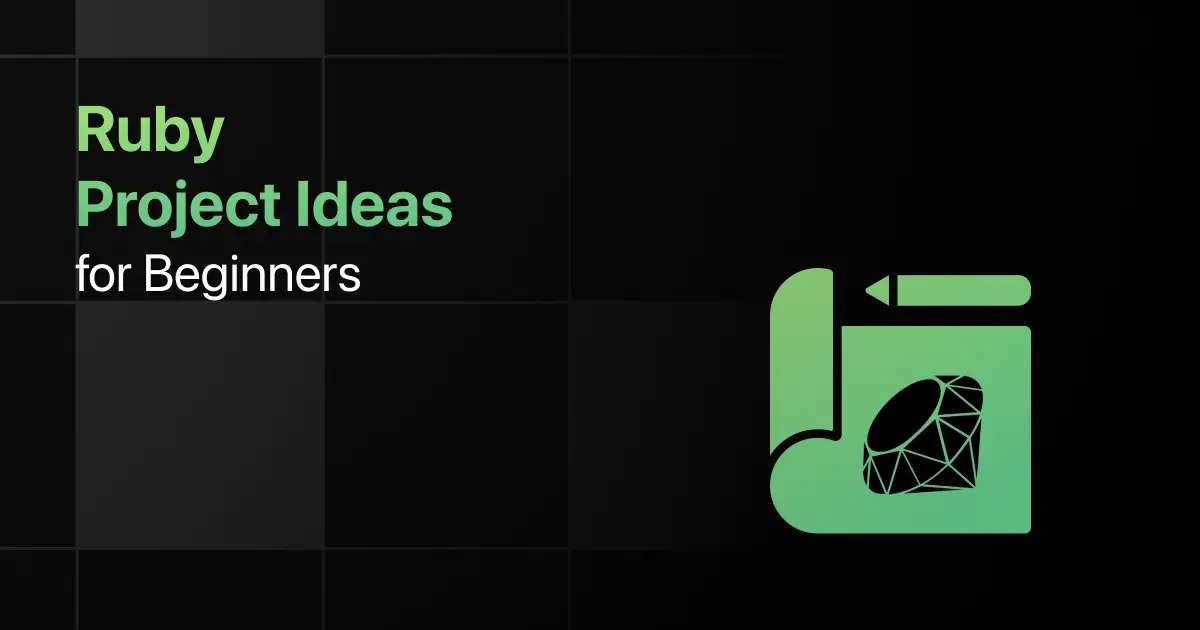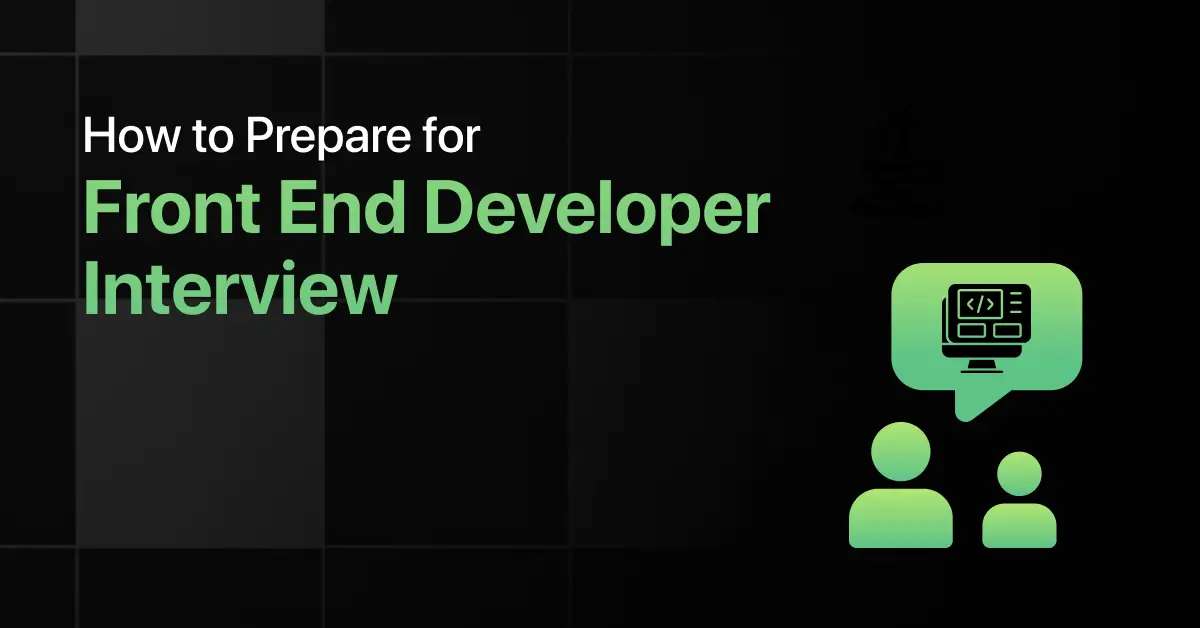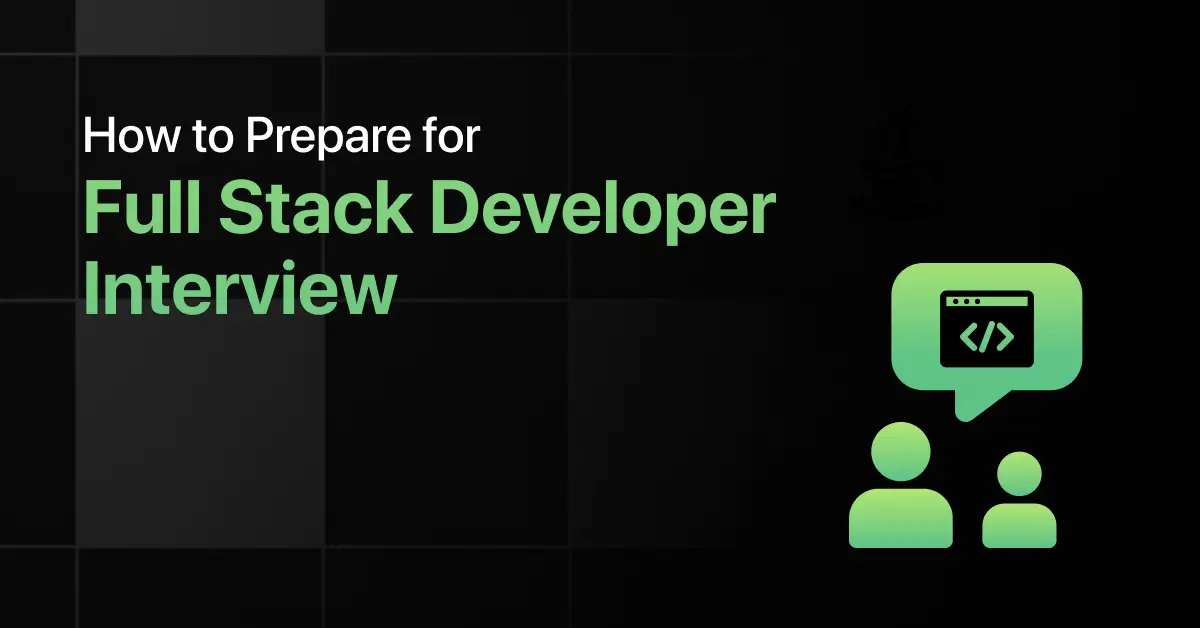Best Ruby Project Ideas for Beginners

Are you learning Ruby and wondering how to put your skills into practice with real-world projects? Working on beginner Ruby projects is one of the best ways to understand the language’s syntax, logic, and powerful features.
Ruby is known for its simplicity and developer-friendly design, making it ideal for building everything from small scripts to web applications.
In this list, you’ll find beginner-friendly Ruby project ideas that will help you strengthen your coding logic, explore Ruby’s core features, and build a solid programming foundation.
10 Beginner-Friendly Ruby Project Ideas – Overview
Here’s an overview of the 10 best Ruby Project Ideas for beginners:
| S.No. | Project Title | Complexity | Estimated Time | Source Code |
|---|---|---|---|---|
| 1 | Number Guessing Game | Easy | 1 hour | Get Started |
| 2 | Simple Calculator CLI | Easy | 2 hours | Get Started |
| 3 | To-Do List App (Command Line) | Easy | 3 hours | Get Started |
| 4 | Contact Book with File Storage | Easy | 4 hours | Get Started |
| 5 | Basic Web Scraper using Nokogiri | Medium | 5 hours | Get Started |
| 6 | URL Shortener (Console App) | Medium | 6 hours | Get Started |
| 7 | Markdown to HTML Converter | Medium | 6 hours | Get Started |
| 8 | Simple Blog with Sinatra Framework | Medium | 8 hours | Get Started |
| 9 | Personal Finance Tracker (CSV-based) | Medium | 10 hours | Get Started |
| 10 | Task Manager Web App with Ruby on Rails | Hard | 12+ hours | Get Started |
Top 10 Ruby Project Ideas for Beginners
Here are the top 10 simple project ideas for beginners.
1. Number Guessing Game
This project is about creating a simple command-line game where the user guesses a randomly generated number.
You’ll learn how to handle input/output, conditionals, and basic loops in Ruby.
Duration: 1 hour
Project Complexity: Easy
Key Concepts Covered:
- User input handling
- Random number generation
- Conditional statements
Implementation Steps:
- Generate a random number within a range (e.g., 1–100).
- Prompt the user to guess the number.
- Compare the guess with the actual number.
- Give feedback (too high/low) until guessed correctly.
- End the game when the correct number is guessed.
Required Pre-requisites:
- Basic Ruby syntax
- Using loops and conditionals
- Working with standard input/output
Resources Required:
- Ruby interpreter
- Text editor or IDE
- Terminal/console
Real-World Application:
- Strengthens logic and flow control concepts
- Helps build interactive CLI-based tools
2. Simple Calculator CLI
This project is about building a command-line calculator that can perform basic arithmetic operations like addition, subtraction, multiplication, and division.
You’ll learn how to work with functions, user input, and error handling in Ruby.
Duration: 2 hours
Project Complexity: Easy
Key Concepts Covered:
- Method definitions
- Command-line input
- Arithmetic operations
Implementation Steps:
- Display a menu for arithmetic operations.
- Take two numeric inputs from the user.
- Perform the selected operation using defined methods.
- Display the result to the user.
- Allow the user to perform another calculation or exit.
Required Pre-requisites:
- Ruby methods and operators
- User input with gets.chomp
- If-else or case statement basics
Resources Required:
- Ruby installed on your system
- Terminal/command prompt
- Text editor or code IDE
Real-World Application:
- Forms the basis of financial or math utilities
- Enhances understanding of code reusability and logic structuring
3. To-Do List App (Command Line)
This project is about creating a simple CLI to-do list where users can add, view, and delete tasks.
You’ll learn how to work with arrays, loops, and basic CRUD operations in Ruby.
Duration: 3 hours
Project Complexity: Easy
Key Concepts Covered:
- Arrays and loops
- User input handling
- Basic CRUD operations
Implementation Steps:
- Initialize an empty array for tasks.
- Provide options to add, view, or delete tasks.
- Update the task list based on user input.
- Loop until the user chooses to exit.
Required Pre-requisites:
- Ruby arrays and loops
- Input/output methods
- Basic control flow
Resources Required:
- Ruby environment
- Text editor or IDE
- Terminal/command line
Real-World Application:
- Basic task management tools
- Introduction to data storage in memory
4. Contact Book with File Storage
This project is about building a CLI contact book that can save, read, and delete contacts using file storage.
You’ll learn how to handle files and implement persistent storage in Ruby.
Duration: 4 hours
Project Complexity: Easy
Key Concepts Covered:
- File reading/writing
- Data persistence
- Object handling
Implementation Steps:
- Create a file to store contacts.
- Add, view, and delete contacts saved in the file.
- Read contacts from the file at startup.
- Update the file after every operation.
Required Pre-requisites:
- Basic file operations in Ruby
- Array and hash usage
- CLI input handling
Resources Required:
- Ruby interpreter
- Text editor
- File system access
Real-World Application:
- Data persistence in simple apps
- Contact management systems
5. Basic Web Scraper using Nokogiri
This project is about scraping data from web pages using the Nokogiri gem in Ruby.
You’ll learn how to parse HTML, extract data, and work with external libraries.
Duration: 5 hours
Project Complexity: Medium
Key Concepts Covered:
- Web scraping basics
- HTML parsing
- Using Ruby gems
Implementation Steps:
- Install Nokogiri gem.
- Fetch a webpage’s HTML content.
- Parse HTML and extract target data.
- Output or save the extracted data.
Required Pre-requisites:
- Basic Ruby programming
- Installing and using gems
- Understanding of HTML structure
Resources Required:
- Ruby with Nokogiri gem
- Internet connection
- Text editor/IDE
Real-World Application:
- Data extraction for analytics
- Automating information gathering
6. URL Shortener (Console App)
This project is about building a simple URL shortener in the console that generates short aliases for long URLs.
You’ll learn string manipulation, hashing, and simple data storage.
Duration: 6 hours
Project Complexity: Medium
Key Concepts Covered:
- String operations
- Hashing techniques
- Data storage in files or memory
Implementation Steps:
- Accept a long URL input.
- Generate a short alias using hashing or encoding.
- Save the mapping between short and long URLs.
- Retrieve original URL from the alias.
Required Pre-requisites:
- Ruby string manipulation
- File or memory storage basics
- Hash functions
Resources Required:
- Ruby interpreter
- Text editor
- Terminal/console
Real-World Application:
- URL management systems
- Understanding data mapping and encoding
7. Markdown to HTML Converter
This project is about converting markdown text files into HTML format using Ruby.
You’ll learn text parsing, file I/O, and basic markup conversion.
Duration: 6 hours
Project Complexity: Medium
Key Concepts Covered:
- Text parsing
- File reading/writing
- String manipulation
Implementation Steps:
- Read markdown file input.
- Parse markdown syntax (headers, bold, italics).
- Convert parsed content to HTML tags.
- Write the output to an HTML file.
Required Pre-requisites:
- Ruby file handling
- Regular expressions basics
- String processing
Resources Required:
- Ruby interpreter
- Text editor
- Sample markdown files
Real-World Application:
- Content management systems
- Static site generators
8. Simple Blog with Sinatra Framework
This project is about building a basic blog application using the Sinatra Ruby web framework.
You’ll learn web routing, templating, and basic CRUD operations.
Duration: 8 hours
Project Complexity: Medium
Key Concepts Covered:
- Sinatra routing
- Views and templates
- Basic database CRUD
Implementation Steps:
- Set up Sinatra project.
- Create routes for viewing, adding, editing posts.
- Use embedded Ruby (ERB) for templates.
- Store posts in a simple database or file.
Required Pre-requisites:
- Basic Ruby programming
- Understanding of HTTP and web servers
- Familiarity with Sinatra basics
Resources Required:
- Ruby with Sinatra gem
- Text editor/IDE
- Local development environment
Real-World Application:
- Web application development
- Blogging platforms
9. Personal Finance Tracker (CSV-based)
This project is about building a CLI finance tracker that records expenses and incomes using CSV files.
You’ll learn file handling, data storage, and simple reporting in Ruby.
Duration: 10 hours
Project Complexity: Medium
Key Concepts Covered:
- CSV file manipulation
- Data aggregation
- Command-line interfaces
Implementation Steps:
- Create or read a CSV file for transactions.
- Add income and expense entries.
- Calculate balance and generate reports.
- Save updates to the CSV file.
Required Pre-requisites:
- Ruby file and CSV handling
- Basic arithmetic in Ruby
- CLI input/output
Resources Required:
- Ruby interpreter
- CSV library (built-in)
- Text editor
Real-World Application:
- Personal finance management
- Data-driven decision making
10. Task Manager Web App with Ruby on Rails
This project is about creating a full-stack task management web application using Ruby on Rails.
You’ll learn MVC architecture, database integration, and web development.
Duration: 12+ hours
Project Complexity: Hard
Key Concepts Covered:
- Ruby on Rails framework
- MVC pattern
- Database CRUD operations
Implementation Steps:
- Set up Rails environment.
- Create models, views, and controllers for tasks.
- Implement user authentication (optional).
- Deploy the app locally or on a server.
Required Pre-requisites:
- Basic Ruby and web knowledge
- Understanding of databases and SQL
- Familiarity with Rails basics
Resources Required:
- Ruby on Rails installed
- Database (SQLite/PostgreSQL)
- Code editor
Real-World Application:
- Professional web app development
- Productivity and project management tools
Final Words
Ruby projects for beginners are a fun and practical way to reinforce your coding knowledge while solving real problems. They help you gain experience with Ruby’s clean syntax, object-oriented structure, and commonly used libraries.
By working through these beginner Ruby projects, you’ll not only grow more confident in your coding abilities but also be better prepared to explore web development, automation, and more advanced Ruby frameworks like Ruby on Rails.
Explore More Project Ideas
- Python
- Java
- C Programming
- HTML and CSS
- React
- JavaScript
- PHP
- C++
- DBMS
- SQL
- Excel
- Angular
- Node JS
- DSA
- Django
- Power BI
- R Programming
- Operating System
- MongoDB
- React Native
- Golang
- Matlab
- Tableau
- .Net
- Bootstrap
- C#
- Next JS
- Kotlin
- jQuery
- React Redux
- Rust
- Shell Scripting
- Vue JS
- TypeScript
- Swift
- Perl
- Scala
- Figma
- RPA
- UI/UX
- Automation Testing
- Blockchain
- Cloud Computing
- DevOps
- Selenium
- Internet of Things
- Web Development
- Data Science
- Android
- Data Analytics
- Front-End
- Back End
- MERN Stack
- Big Data
- Data Engineering
- Full Stack
- MEAN Stack
- Artificial Intelligence
- Machine Learning
- Arduino
- Cyber Security
- Raspberry Pi
- Spring Boot
- NLP
- Embedded Systems
- Computer Network
- Game Development
- Flask
- Data Visualization
- Ethical Hacking
- Computer Vision
- AWS
- Data Mining
- Azure
- Network Security
- Microservices
- Augmented Reality
- Bioinformatics
- Virtual Reality
- Text Mining
- Unity
- Kubernetes
- Unreal Engine
- Terraform
- Linux
- Chatbot
- Deep Learning
- API
- Cloud Security
- Home Automation
- Quantum Computing
- FinTech
- Sentiment Analysis
- Recommendation System
- Robotics
- NodeMCU
- Large Language Models
- Penetration Testing
- Google Cloud Platform
- Edge Computing
- Pattern Recognition
- ElasticSearch
- MLflow
- Voice Recognition
- Data Recognition
- Keras
- WordPress
- TensorFlow
FAQs
Easy Ruby project ideas for beginners include building a calculator, a to-do list app, a number guessing game, or a basic contact manager.
Ruby project ideas are important for beginners because they provide hands-on practice that helps build confidence and strengthen problem-solving skills.
Beginners can learn core Ruby skills such as variables, loops, conditionals, classes, and working with files or user input through these projects.
A recommended Ruby project for someone with no prior programming experience is a simple text-based number-guessing game.
It typically takes a few hours to a few days to complete a beginner-level Ruby project, depending on its complexity and the learner’s pace.
Related Posts


How to Prepare for .Net Interview
Are you preparing for a .NET interview but not sure which topics to prioritize? Many candidates struggle to balance C# fundamentals, …
Warning: Undefined variable $post_id in /var/www/wordpress/wp-content/themes/placementpreparation/template-parts/popup-zenlite.php on line 1050








